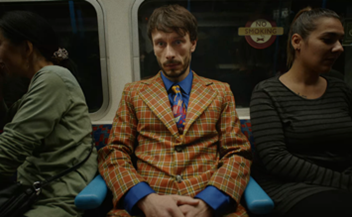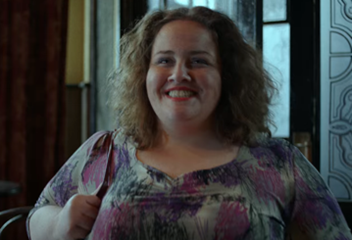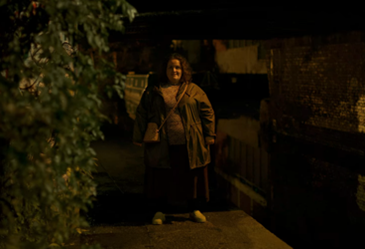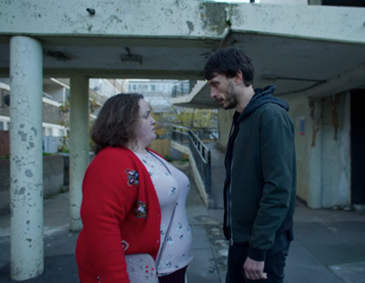Regardless as to whether you have seen it, you probably have some awareness of Baby Reindeer, the autobiographical miniseries from Richard Gadd, which was released on Netflix in April 2024. The seven-part drama thriller recounts a stalking experience that Gadd suffered during his twenties while he was attempting to embark on a career as a stand-up comedian. Gadd plays a fictionalised version of himself through the alias character Donny Dunn who works behind a bar when not performing. It is here that he encounters Martha (Jessica Gunning) the woman who will become obsessed with him after he buys her a cup of tea while she is desolate.
The programme emphasises more than once that this act of kindness is the marker for the harrowing and excessive contact that followed, which included “41,071 emails, 46 Facebook messages, 350 hours of voicemails and 106 pages of letters.”[1] Gadd’s programme is clearly a cathartic vessel to deal with the trauma he experienced (not just from Martha) but also an encounter (relayed in flashback) from an influential male character who sexually grooms Gadd with the promise of a comedy writing career before raping him. As viewers learn, the sexual assault is in part why Gadd allows Martha into his life. Her “pure unadulterated adoration”[2] of him fills the void from trauma, broken self-confidence and a stagnant comedy career. As Gadd highlights, Martha sees him how he wants to be seen, which he subsequently feeds off through playful affection, often in spite of the vivid warning signs that signal her psychological instability.
Gadd has made clear in a number of interviews how he didn’t want to do a typical stalker story that simply presents an innocent victim and evil stalker but instead was more concerned in showing the nuances of the human condition as a mixture of good and bad. However, while he succeeds in addressing the complexity of his own state the depiction of Martha can often feel like a monstrous adversary, who at time is presented lurking in shadows, or suddenly appearing into frame reminiscent of Kathy Bates’s performance in Rob Reiner’s Misery (1990).
Despite Gadd’s efforts to move away from the two-dimensional villain, there is an aura of monstrous familiarity encoded in Martha recognisable in a wide range of films that play on our fears, including Fatal Attraction (Adrian Lyne, 1987), Halloween (John Carpenter, 1978) or even Jaws (Steven Spielberg, 1975). Like the ‘bunny boiler’, Michael Myers or great white shark, Martha (like typical horror monsters) is an adversary that Gadd and the audience know very little about. As viewers, our only context of her is through her obsession with Donny which, in turn, diminishes the status of her character as one that is fully fleshed out, particularly when compared to Gadd.
With Gadd in the triplicate position of writer, performer and experiencer of the programme’s events, a viewer may query as to whether enough distance and objectivity is being given to a show that wants to present the nuance of the human condition. Of course, Gadd is limited and can only truthfully present what he witnessed and experienced, but does that then become symptomatic of unreliable narration? Throughout Baby Reindeer I was reminded of a specific form of storytelling that is evident in Martin Scorsese’s Taxi Driver (1976) and The King of Comedy (1982) and more recently Todd Phillip’s Joker (2019) (which channels the other two), namely the art of monocular vision. Paul Schrader (the screen writer of Taxi Driver) describes monocular as a technique in which the central protagonist is present in every scene, enabling an audience to build empathy with this character regardless as to whether or not it is deserved.[3] The ardent fandom towards Travis Bickle or Arthur Fleck can in part be owed toward this specific style of shooting which binds the viewer to their gaze and outlook of the world. This viewpoint is even emphasised by Martha in the first episode when she discusses her desire to unzip Donny from chin to belly and climb in, tucking herself away in order to observe the world from this alternate perspective. This eccentric fantasy however seems to be something of a blueprint for the programme as Martha’s identity, history, backstory and events that lead her into Donny/Gadd’s life are all kept offscreen.
Consequentially an allegiance is formed toward the victim Gadd, juxtaposed with the mystery, otherness and monstrousness that is Martha. Such a division is perhaps responsible for what is now a vehement online endeavour to expose real-life Martha. Gadd has asked viewers to not speculate “on who any of the real life people could be. That’s not the point of [the] show.”[4] However, such expectations of viewers seem displaced in a world in which Anna Gunn could receive such real-life hostility for nothing more than playing Skyler White, the unpopular fictional character who stands up to drug kingpin husband in AMC’s Breaking Bad (2008-2013)[5], now a staple of Netflix. As Margrethe Bruun Vaage highlights in The Antihero in American Television (by way of TV critic Emily Nussbaum), such reception from viewers can be described as ‘bad fans’. “What the bad fan appreciates is not what has elevated [a] series to status as art.”[6] Instead, bad fans root for toxic behaviour, cheering on Walter White while vehemently detesting Skyler for getting in his way, emulating real-life toxicity straight from the screen.
Similarly, Martha’s stalking has prompted bad fans to become stalkers, rooting out and exposing a woman whom Gadd highlights was clearly unwell. Bad fans and keyboard warriors undertake armchair-detective work, scrutinising social media accounts to piece together information in order to expose and troll. A strange sense of ownership from these bad fans suggests that they have a right to know who the real-life Martha is, despite the fact that a judicial sentence was passed (according to the programme), and that Gadd doesn’t want them to look. This sense of ownership in bad fans, also translates through extreme adulation, particularly when fans imprint expectations onto their idols, which can be just as disconcerting. I was recently reminded of this when a news article surfaced about K-Pop singer, Karina, from a group called Aespa, who felt compelled to issue an apology to her fans for having a relationship with someone without their knowledge. Her private life was deemed unacceptable by her fans and the concealment of her love life a slight on their collective part. Such virtual ownership becomes exacerbated by screen technology which seemingly moves fans (like stalkers) closer to their target. In Baby Reindeer Martha excessively likes and comments on all of Donny’s Facebook posts, marking her territory over him. Bad fans do likewise, sharing and deciphering who the real-life Martha might be, driven by a virtual sense of misplaced justice that her actions on Donny is an affront towards them collectively.
As Netflix has long been part of a detective-armchair genre, prompting viewers to Google details from questionable figures in the limelight, including Joe Exotic in Tiger King (2020-21)[7] or Steven Avery in Making a Murder (2015-18)[8], perhaps an appropriate question is whether Netflix has a duty of care for certain content, particularly when considering the fallout of specific shows and retellings of real events. The news stories surrounding a woman accused of being the real-life Martha, now allegedly threatening to sue Netflix, of course galvanizes interest in the programme, driving new viewers to seek it out. This however seems a macabre way of generating audiences and could potentially lead to the removal of the programme. It is also eerily reminiscent of the recent Black Mirror (2011-present)[9] episode ‘Joan is Awful’ (2023) when a woman unexpectedly finds her life to be the subject of a fictional Netflix show. Joan is presented as powerless against the corporate streaming services who ultimately take over her life, merging her reality with a televised narrative in order to generate subscriptions. It would seem in the case of Baby Reindeer that life is now imitating art.
This is, of course, not to say that such programming shouldn’t be made, there is a hugely positive message to be taken from Gadd, who has creatively churned his trauma into a successful one-man show in Edinburgh and London, as well as the miniseries, allowing him to take back some control. Furthermore, it offers exceptional performances from Gunning and Nava Mau who plays Donny’s real love interest. Gadd is also a fascinating presence onscreen, fluctuating between nervous tension and genuine fear as he attempts to navigate his life and performance career through Martha-infested-waters. Perhaps the closed-nature of the series is what is prompting bad fans to stir up some kind of real-life sequel. Or maybe Gadd’s performance in the show straddles the difficult position of moving on from the very encounter that continues to haunt him. Potentially casting someone else would have reduced the programme’s proximity to reality, and in turn reduced the investigative work that bad fans have undertaken. Or maybe Netflix needs to reassess just how influential their streaming service is, particularly as content spills into reality. Creating new structures and job opportunities to assess risks while adopting new ways to minimise and protect the anonymity of those, who like Joan, wake to find themselves stars of shows they haven’t consciously consented to. We have a right to tell and share stories, but also have a right to choose when to switch off from them. Without this, we are no better than Martha.
Dr Daniel O’Brien is a Lecturer in Film and Digital Media at The University of Essex. His teaching and areas of research span across film, video game studies, interactive media art and video essaying. He has published work in all these subjects. Recent publications include “Digital Love: Through the Screen/Of the Screen” (Bloomsbury, 2023), “The Time-Loop as Game Mechanic, Narrative Device and Cycle of Systemic Racism” (Video-Essay, NECSUS, 2023) and “Zoom’s Performative Window: Affordances and Constraints” (Bloomsbury, 2024). Daniel is also working on a monograph titled Postphenomenology and Narrative Across Cinema, Interactive Art and Gaming with Edinburgh University Press.
References
“Interview with Paul Schrader.” [In English]. Projections 15, no. 1 (01 Mar. 2021 2021): 78-87. https://doi.org/10.3167/proj.2021.150105.
Vaage, M.B. The Antihero in American Television. Taylor & Francis, 2015.
Footnotes
[1] Richard Gadd, Baby Reindeer, 2024.
[2] Richard Gadd on This Morning.
[3] “Interview with Paul Schrader,” Projections 15, no. 1 (01 Mar. 2021 2021), cstonline.netdoi.org/10.3167/proj.2021.150105.
[4] Richard Gadd, X Formerly Twitter.
[5] Vince Gilligan, Breaking Bad, 2008-2013.
[6] M.B. Vaage, The Antihero in American Television (Taylor & Francis, 2015).
[7] Rebecca Chaiklin & Eric Goode, Tiger King, 2020-21.
[8] Moira Demos & Laura Ricciardi, Making a Murderer, 2015-18.
[9] Charlie Brooker, Black Mirror, 2011-Present.
Piers Morgan interviews ‘the real Martha’, 9 May 2024:









